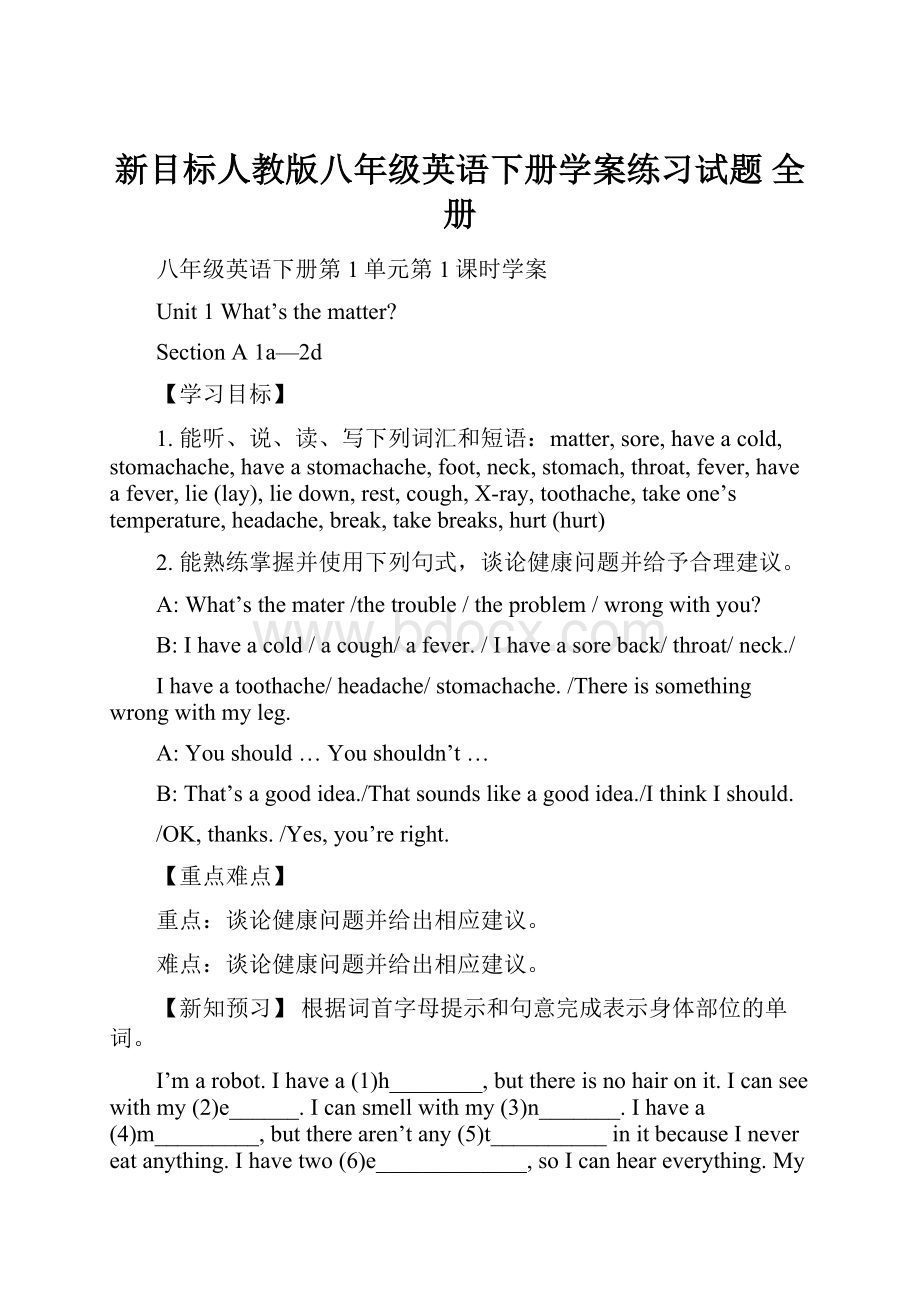新目标人教版八年级英语下册学案练习试题 全册.docx
《新目标人教版八年级英语下册学案练习试题 全册.docx》由会员分享,可在线阅读,更多相关《新目标人教版八年级英语下册学案练习试题 全册.docx(281页珍藏版)》请在冰豆网上搜索。

新目标人教版八年级英语下册学案练习试题全册
八年级英语下册第1单元第1课时学案
Unit1What’sthematter?
SectionA1a—2d
【学习目标】
1.能听、说、读、写下列词汇和短语:
matter,sore,haveacold,stomachache,haveastomachache,foot,neck,stomach,throat,fever,haveafever,lie(lay),liedown,rest,cough,X-ray,toothache,takeone’stemperature,headache,break,takebreaks,hurt(hurt)
2.能熟练掌握并使用下列句式,谈论健康问题并给予合理建议。
A:
What’sthemater/thetrouble/theproblem/wrongwithyou?
B:
Ihaveacold/acough/afever./Ihaveasoreback/throat/neck./
Ihaveatoothache/headache/stomachache./Thereissomethingwrongwithmyleg.
A:
Youshould…Youshouldn’t…
B:
That’sagoodidea./Thatsoundslikeagoodidea./IthinkIshould.
/OK,thanks./Yes,you’reright.
【重点难点】
重点:
谈论健康问题并给出相应建议。
难点:
谈论健康问题并给出相应建议。
【新知预习】根据词首字母提示和句意完成表示身体部位的单词。
I’marobot.Ihavea
(1)h________,butthereisnohaironit.Icanseewithmy
(2)e______.Icansmellwithmy(3)n_______.Ihavea(4)m_________,buttherearen’tany(5)t__________initbecauseInevereatanything.Ihavetwo(6)e_____________,soIcanheareverything.My(7)n________isveryshort,soIcan’tturnmyhead.Ihaveastrongbody,butIdon’thavearmsor(8)h_________.Idon’thave(9)l________or(10)f_______,either.SoIcannotwalk.
【课堂探究】
探究1常见的“困难;故障;疾病等”询问方式。
句型What’sthematterwith…?
与What’sthetrouble/theproblem/thedifficulty/wrongwith…?
的含义相同,用于询问某人或某事物所面临的困难、患有的疾病或出现的故障。
(1)matter/trouble/problem/difficulty都属于名词,要与定冠词the连用;wrong属于形容词,不能与定冠词the连用。
(2)with为介词,后跟名词或代词宾格,表示患病、面临困难或出现故障的对象。
探究2常用的“疾病”表达方式。
(1)“havea+病症”型,have意为“患有”。
如:
Shehasacough/acold/afever.她咳嗽/感冒/发烧。
(2)“havea+sore+发病部位”型,其中sore是一个独立的形容词,指的是身体某一部位的酸痛。
如:
Ihaveasoreback/throat/neck.我背痛/喉咙痛/脖子疼。
(3)“havea+部位-ache”型,其中-ache常与表示身体部位的名词合成一个新词,表示身体某部位疼痛。
如:
Ihaveatoothache/headache/stomachache.我牙痛/头痛/胃疼。
(4)“Thereissomethingwrongwith+one’s+部位”型。
如:
Thereissomethingwrongwithmybike.我的自行车坏了。
【针对练习】根据汉语意思完成句子。
1.我头痛和牙痛。
Ihavea_______________and______________.
2.她感冒且发烧。
Shehasa___________and____________________.
3.他咳嗽且喉咙痛。
Hehasa___________and__________________________.
4.我的钟表坏了。
Thereis_____________________________withmyclock.
【达标练习】
一、单项选择。
()l.—What’sthematter_________you?
—Ihaveaheadache.
A.toB.withC.forD.about
()2.Shetalked_________anddidn’tdrinkenoughwater,soshehasasorethroat.
A.toomuchB.toomanyC.muchtooD.manytoo
()3.Lisahasa________andshecouldn’tspeakaword.
A.coldB.sorebackC.sorethroatD.toothache
()4.Tomhasa_____________becauseheatetoomuchjunkfoodatthepartylastnight.
A.stomachacheB.sorebackC.coldD.fever
()5.—I’mnotfeelingwell,Ihaveaheadache.—_________
A.Youshouldseeadentist.B.Youshouldplaysoccerandexercise.
C.Itdoesn’tmatter.D.I’msorrytohearthat.
二、用所给单词的适当形式填空。
1.Thebabyhasfour__________(tooth)now.
2.Helefttheroomwithout______________(say)anywords.
3.Lucyhasatoothache.Sosheshould________(see)adentistand_______(get)anX-ray.
4.Tomcut_____________(him)andheshouldputsomemedicineonit.
5.Ifyoudon’tgotothedentist,it______________(hurt)evenmorelater.
三、根据所给汉语提示完成英语句子。
1.你怎么样了?
What’sthe_______________you?
2.听起来好像你发烧了。
你应该测一下体温。
It__________________youhaveafever.Youshould_____________________________.
3.他应该喝加蜂蜜的热茶。
Heshoulddrinksomehottea_______________________.
4.你应该躺下休息。
Youshould__________________andrest.
5.你需要离开电脑,短暂休息。
Youneedto___________________awayfromthecomputer.
●Time,Timeagain,Iaskmyself(请写出这节课你的收获,完成下面的反思)
【学后反思】
八年级英语下册第1单元第1课时学案答案
Unit1What’sthematter?
SectionA1a—2d
【新知预习】
根据词首字母提示和句意完成表示身体部位的单词。
(1)head
(2)eyes(3)nose(4)mouth(5)teeth(6)ears(7)neck(8)hands
(9)legs(10)feet
探究2常用的“疾病”表达方式。
【针对练习】根据汉语意思完成句子。
1.headache;toothache2.cold;afever3.cough;asorethroat4.somethingwrong
【达标练习】
一、单项选择。
1.B考查介词习惯搭配。
2.A考查副词much用于修饰动词talk,其中too表示程度。
3.C根据下文couldn’tspeakaword这一症状判断,所患疾病应该是hasasorethroat。
4.A根据下文atetoomuchjunkfood这一语境判断,所患疾病应该是hasastomachache。
5.D考查交际应答。
根据对方身体不适的描述,针对四个选项答语,只有选项DI’msorrytohearthat所表达的遗憾和同情符合题意。
二、用所给单词的适当形式填空。
1.teeth根据数字four判断,要使用复数形式。
2.sayingwithout属于否定介词,后跟动词-ing形式。
3.see;getshould属于情态动词,后跟动词原形。
4.himself根据割伤自己这一语境,后跟反身代词。
5.willhurt根据时间状语later判断,要使用一般将来时。
三、根据所给汉语提示完成英语句子。
1.matterwith2.soundslike;takeyourtemperature3.withhoney4.liedown
5.takebreaks
八年级英语下册第1单元第2课时学案
Unit1What’sthematter?
SectionA3a—3c
【学习目标】
1.能听、说、读、写下列词汇和短语:
passenger,off,getoff,toone’ssurprise,onto,trouble,hit(hit),rightaway,getinto
2.能熟练掌握并使用以下常用表达。
(1)与“bus”相关的表述:
busNo.26,busdriver,driverofbusNo.26,stopthebus,thepassengersonthebus,movethemanontothebus,geton/offthebus,waitforthenextbus
(2)与医疗急救相关的表述:
seeanoldmanlyingonthesideoftheroad,haveaheartproblem,gotothehospital,takethemantothehospital,savethemanintime,onlythinkaboutsavingalife,actquickly
(3)其他值得学习的表述:
toone’ssurprise,expectsbtodosth,agreetodosth,getintotrouble,intime,withoutthinkingtwice
【重点难点】
重点:
通过阅读训练,养成良好的阅读习惯,发展学生的阅读技能。
难点:
通过阅读训练,养成良好的阅读习惯,发展学生的阅读技能。
【新知预习】选词填空
getoffhittroubletomysurprisepassengers
1.Heoftenhelpsothersandheisn’tafraidtogetinto____________.
2.ItwasNationalDayyesterday,andthereweretoomany________________onthetrain.
3.Unluckily,busNo.26___________theoldmanyesterday.
4.Hewill______________thebusatthenextbusstop.
5.Iwasworryingaboutwhattocookforlunch.__________,lunchwasreadywhenIgothome.
【课堂探究】
探究1Thebusdriver,24-year-oldWangPing,stoppedthebuswithoutthinkingtwice.
(1)24-year-old由连字符连接,中间的名词year要用单数,是一个合成形容词,用于修饰名词,意为“24岁的”。
24yearsold中的名词year要用复数,意为“24岁”。
试比较:
Sheisa12-year-oldgirl.=Thegirlis12yearsold.
(2)without为否定介词,意为“无;没有”,反义词为with,后跟名词、代词或动名词。
【针对练习】根据汉语提示完成英语句子。
My_______________(十岁的)brotherwenttoschoolwithout_________(吃)breakfast.
探究2Hegotoffandaskedthewomanwhathappened.
getoff意为“下车”,其反义词组为geton(上车)。
此外,常见的get动词短语还有:
getto(到达),getinto(陷入),getup(起床),getoutof(离开)等。
【针对练习】单项填空
Youshouldn’t______thebusbeforeitstops.AgetupB.getintoC.gettoD.getoff
探究3Buttohissurprise,theyallagreedtogowithhim.
(1)toone’ssurprise为固定搭配,意为“使…惊讶的是”,用于引出下文。
(2)agreetodosth意为“同意做某事”。
【针对练习】用所给动词的适当形式填空。
1.To________(we)surprise,hewonthefirstprizeintheEnglishSpeechcompetition.
2.Mymotheragreed___________(go)tothezoowithme.
探究4ThankstoMr.Wangandthepassengers,thedoctorsavedthemanintime.
(1)thanksto意为“幸亏;由于”,用于句首或句尾,且用逗号与句子主体隔开。
thanksfor意为“因…而感谢”。
(2)intime意为“及时”,意指“恰好赶上或恰在需要时”;ontime意为“按时”,强调做事情的计划性。
【针对练习】选词填空
1.___________theGreatGreenWall,theenvironmentgetsbetter.(Thanksto/Thanksfor)
2.Thetrainusuallyarrivesatthetrainstation______________.(intime/ontime)
【达标练习】
一、用括号内所给单词的适当形式填空。
1.HedecidedtovisittheGreatWallonvacationwithoutthinking_____________(two).
2.Iwasvery______________(surprise)thatmyparentsagreedwithme.
3.Ifyoumakeyourdreamcometrue.youshouldact______________(quick)tostudyhard.
4.Thedriverthoughtmostorallofthepassengersdidn’tagree____________(stop)thebus.
5.Look!
Anoldman________________(lie)onthesideoftheroad.
二、根据所给汉语提示完成英语句子。
1.He_______________(下车)thebus,buthelefthisschoolbagonit.
2.Themanhadaheartproblemandshouldgotothehospital___________________(立即).
3.Hedidn’tthinkabout___________(他自己),heonlythoughtabout__________(拯救)alife.
4.Somepassengershelpedto________theoldman________(抬上)thebus.
5.Luckily,Iwentintothecinema_________________(及时)beforethemoviestarted.
●Time,Timeagain,Iaskmyself(请写出这节课你的收获,完成下面的反思)
【学后反思】
八年级英语下册第1单元第2课时学案答案
Unit1What’sthematter?
SectionA3a—3c
【新知预习】
1.trouble2.passengers3.hit4.getoff5.Tomysurprise
【课堂探究】
探究1【针对练习】根据汉语提示完成英语句子。
ten-year-old;having/eating
探究2【针对练习】单项填空
D
探究3【针对练习】用所给动词的适当形式填空。
1.our2.togo
探究4【针对练习】选词填空
1.Thanksto2.ontime
【达标练习】
一、用括号内所给单词的适当形式填空。
1.twice根据语境“毫不犹豫地”判断,考查次数。
2.surprised-ed形容词用于描述人的情绪情感。
3.quickly考查副词修饰行为动词。
4.tostop考查agreetodosth
5.islying由情景Look!
判断,考查现在进行时。
二、根据所给汉语提示完成英语句子。
1.gotoff2.rightaway/atonce3.himself;saving4.move;onto5.intime
八年级英语下册第1单元第3课时学案
Unit1What’sthematter?
SectionAGrammarfocus—4c
【学习目标】
1.能听、说、读、写下列词汇和短语:
herself,falldown
2.能正确使用反身代词。
3.能运用下列句型对疾病及事故伤害进行询问及应答。
—What’sthematterwithBen?
—Hehurthimself.Hehasasoreback.
—Doyouhaveafever?
—Yes,Ido./No,Idon’t./Idon’tknow.
4.能利用情态动词should询问及陈述建议。
—Whatshouldshedo?
—Sheshouldtakehertemperature.
【重点难点】
重点:
谈论健康问题并给予合理建议。
难点:
谈论健康问题并给予合理建议。
【新知预习】根据句意及词首字母提示完成单词。
1.Davidfelld______________whenheplayedsocceryesterday.
2.—Katecuth______________.—Sheshouldputsomemedicineonit.
3.Whenyoucatchacold,yous_______________drinkmorewater.
4.It’sagoodhabittobrushyourt______________twiceaday.
5.Hisfatherhasas___________back,hecan’twork.
【课堂探究】
探究观察表格,探究反身代词的构成与用法。
第一人称
第二人称
第三人称
单数
myself
yourself
himself/herself/itself
复数
ourselves
yourselves
themselves
1.反身代词的构成
通过观察发现,反身代词单数形式由_________收尾,复数形式由__________收尾。
第一、二人称的反身代词由_________________与self/selves合成,第三人称的反身代词由_________与self/selves合成。
2.反身代词的用法。
(1)用作动词或介词的宾语,表示动作落到主语本身,它要与主语的人称和数保持一致。
常见搭配有:
enjoyoneself=haveagoodtime玩得高兴;teachoneself=learn…byoneself自学;byoneself=alone独自;helponeselfto…随便吃;introduceo